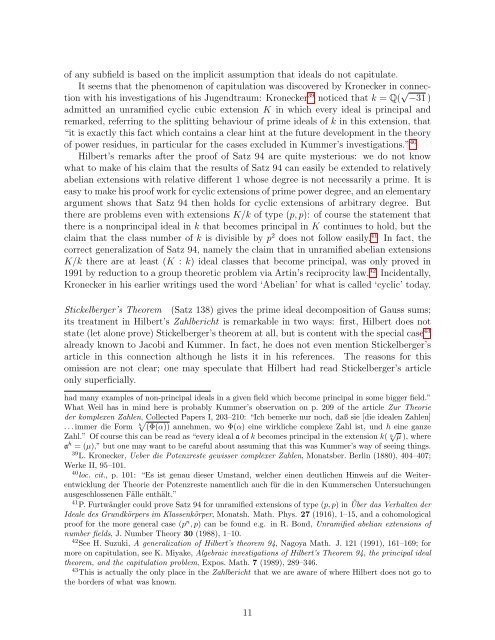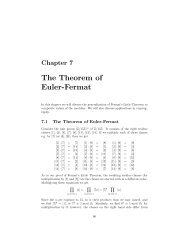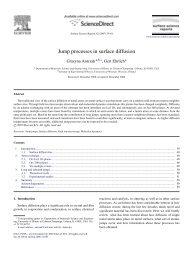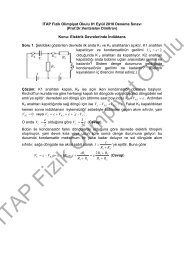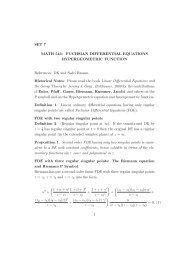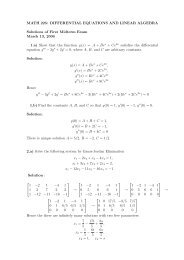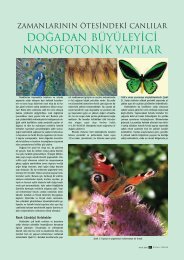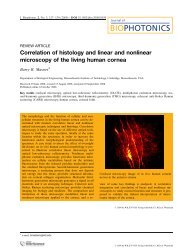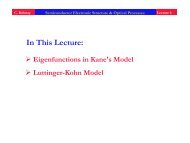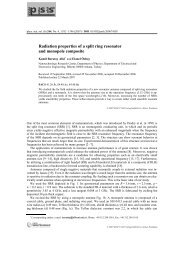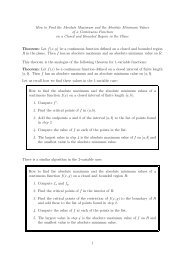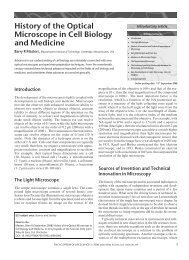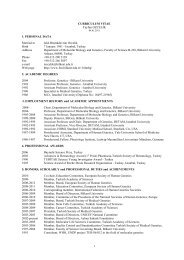Introduction to the English Edition of Hilbert's Zahlbericht
Introduction to the English Edition of Hilbert's Zahlbericht
Introduction to the English Edition of Hilbert's Zahlbericht
Create successful ePaper yourself
Turn your PDF publications into a flip-book with our unique Google optimized e-Paper software.
<strong>of</strong> any subfield is based on <strong>the</strong> implicit assumption that ideals do not capitulate.<br />
It seems that <strong>the</strong> phenomenon <strong>of</strong> capitulation was discovered by Kronecker in connection<br />
with his investigations <strong>of</strong> his Jugendtraum: Kronecker 39 noticed that k = Q( √ −31 )<br />
admitted an unramified cyclic cubic extension K in which every ideal is principal and<br />
remarked, referring <strong>to</strong> <strong>the</strong> splitting behaviour <strong>of</strong> prime ideals <strong>of</strong> k in this extension, that<br />
“it is exactly this fact which contains a clear hint at <strong>the</strong> future development in <strong>the</strong> <strong>the</strong>ory<br />
<strong>of</strong> power residues, in particular for <strong>the</strong> cases excluded in Kummer’s investigations.” 40<br />
Hilbert’s remarks after <strong>the</strong> pro<strong>of</strong> <strong>of</strong> Satz 94 are quite mysterious: we do not know<br />
what <strong>to</strong> make <strong>of</strong> his claim that <strong>the</strong> results <strong>of</strong> Satz 94 can easily be extended <strong>to</strong> relatively<br />
abelian extensions with relative different 1 whose degree is not necessarily a prime. It is<br />
easy <strong>to</strong> make his pro<strong>of</strong> work for cyclic extensions <strong>of</strong> prime power degree, and an elementary<br />
argument shows that Satz 94 <strong>the</strong>n holds for cyclic extensions <strong>of</strong> arbitrary degree. But<br />
<strong>the</strong>re are problems even with extensions K/k <strong>of</strong> type (p, p): <strong>of</strong> course <strong>the</strong> statement that<br />
<strong>the</strong>re is a nonprincipal ideal in k that becomes principal in K continues <strong>to</strong> hold, but <strong>the</strong><br />
claim that <strong>the</strong> class number <strong>of</strong> k is divisible by p 2 does not follow easily. 41 In fact, <strong>the</strong><br />
correct generalization <strong>of</strong> Satz 94, namely <strong>the</strong> claim that in unramified abelian extensions<br />
K/k <strong>the</strong>re are at least (K : k) ideal classes that become principal, was only proved in<br />
1991 by reduction <strong>to</strong> a group <strong>the</strong>oretic problem via Artin’s reciprocity law. 42 Incidentally,<br />
Kronecker in his earlier writings used <strong>the</strong> word ‘Abelian’ for what is called ‘cyclic’ <strong>to</strong>day.<br />
Stickelberger’s Theorem (Satz 138) gives <strong>the</strong> prime ideal decomposition <strong>of</strong> Gauss sums;<br />
its treatment in Hilbert’s <strong>Zahlbericht</strong> is remarkable in two ways: first, Hilbert does not<br />
state (let alone prove) Stickelberger’s <strong>the</strong>orem at all, but is content with <strong>the</strong> special case 43<br />
already known <strong>to</strong> Jacobi and Kummer. In fact, he does not even mention Stickelberger’s<br />
article in this connection although he lists it in his references. The reasons for this<br />
omission are not clear; one may speculate that Hilbert had read Stickelberger’s article<br />
only superficially.<br />
had many examples <strong>of</strong> non-principal ideals in a given field which become principal in some bigger field.”<br />
What Weil has in mind here is probably Kummer’s observation on p. 209 <strong>of</strong> <strong>the</strong> article Zur Theorie<br />
der komplexen Zahlen, Collected Papers I, 203–210: “Ich bemerke nur noch, daß sie [die idealen Zahlen]<br />
. . . immer die Form h (Φ(α)) annehmen, wo Φ(α) eine wirkliche complexe Zahl ist, und h eine ganze<br />
Zahl.” Of course this can be read as “every ideal a <strong>of</strong> k becomes principal in <strong>the</strong> extension k( h√ µ ), where<br />
ah = (µ),” but one may want <strong>to</strong> be careful about assuming that this was Kummer’s way <strong>of</strong> seeing things.<br />
39L. Kronecker, Ueber die Potenzreste gewisser complexer Zahlen, Monatsber. Berlin (1880), 404–407;<br />
Werke II, 95–101.<br />
40loc. cit., p. 101: “Es ist genau dieser Umstand, welcher einen deutlichen Hinweis auf die Weiterentwicklung<br />
der Theorie der Potenzreste namentlich auch für die in den Kummerschen Untersuchungen<br />
ausgeschlossenen Fälle enthält.”<br />
41P. Furtwängler could prove Satz 94 for unramified extensions <strong>of</strong> type (p, p) in Über das Verhalten der<br />
Ideale des Grundkörpers im Klassenkörper, Monatsh. Math. Phys. 27 (1916), 1–15, and a cohomological<br />
pro<strong>of</strong> for <strong>the</strong> more general case (pn , p) can be found e.g. in R. Bond, Unramified abelian extensions <strong>of</strong><br />
number fields, J. Number Theory 30 (1988), 1–10.<br />
42See H. Suzuki, A generalization <strong>of</strong> Hilbert’s <strong>the</strong>orem 94, Nagoya Math. J. 121 (1991), 161–169; for<br />
more on capitulation, see K. Miyake, Algebraic investigations <strong>of</strong> Hilbert’s Theorem 94, <strong>the</strong> principal ideal<br />
<strong>the</strong>orem, and <strong>the</strong> capitulation problem, Expos. Math. 7 (1989), 289–346.<br />
43This is actually <strong>the</strong> only place in <strong>the</strong> <strong>Zahlbericht</strong> that we are aware <strong>of</strong> where Hilbert does not go <strong>to</strong><br />
<strong>the</strong> borders <strong>of</strong> what was known.<br />
11


